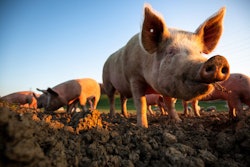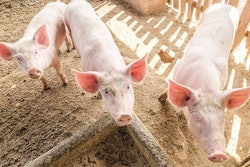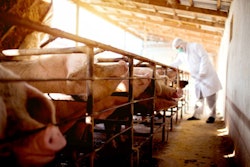
During the past week, 6 European nations have reported new cases in domestic pigs, and 11 in their respective wild boar populations.
Last week, Ekathimerini reported that Greece’s veterinary authorities are on alert for African swine fever (ASF). Focus of the action are two districts in the Central Macedonia region that border Bulgaria.
So far, no cases of ASF have been detected in wild or domestic pigs in Greece for two years. To maintain freedom from the disease, regional veterinary services have stepped up active and passive surveillance of wild boar and farmed swine. Furthermore, biosecurity measures have been intensified for hunting grounds, as well as around pig farms and at border crossings.
Also over the past few days, Italy’s ministry for agricultural policy has reported high-level approval of a decree to protect the nation’s pig farmers. Under this law, ASF is to be eradicated in wild boar in order to protect the Italian pork industry.
This approval means that regional plans for disease control can be implemented. Among the measures is an obligation to report all diseased or dead wild boar to local veterinary services.
Since the first cases on mainland Italy in early January, 35 wild boar have tested positive for the ASF virus. All were found dead in the northwest of the country in one province in each of the regions of Piedmont and Liguria.
One week ago, farmers in Northern Ireland were also warned to be on alert for the risk of ASF.
3 countries report first ASF cases in swine this year
As of February 6, seven European nations had officially confirmed one or more ASF outbreaks among domestic swine so far this year. This is according to the Animal Disease Information Notification System operated by the European Commission (EC).
Of the total of 65 outbreaks for the year so far, Romania accounts for 52.
Reporting their first outbreaks for 2022 were Serbia (seven outbreaks so far), as well as Italy and Moldova — each with one.
Also reporting cases among domestic pigs to the EC this year have been Bulgaria, the Republic of North Macedonia and Slovakia.
Further cases in central, eastern European domestic pigs
Also registering the continent’s most new ASF outbreaks in swine with the World Organisation for Animal Health (OIE) over the past week is Romania.
Romania’s first ASF cases were officially recorded in autumn 2019. Since then, the infection has spread widely across southern, central and eastern regions of the country.
Of the 19 latest confirmed outbreaks, 16 were in small backyard herds, and in one village, an infected carcass was found dumped in a public place.
However, the other two recent Romanian outbreaks affected commercial pig herds. During the first week of February, the ASF virus was detected at a premises with approximately 3,500 animals in the south of the country. Just one day later, some of the 19,400 pigs at a farm in the southeast of the country tested positive for the virus after several animals died unexpectedly.
After an absence of more than one year, ASF was detected again in the Zhytomyr region of Ukraine last week. According to the official OIE report, the disease outbreak was at a small farm with 95 pigs, two of which died.
Located in the north of Ukraine, Zhytomyr borders Belarus.
Also registering an additional ASF outbreak in swine to the OIE over the past week was Poland. Reported retrospectively, the outbreak occurred in September 2020 in a backyard pig herd.
ASF resolved in 3 regions of western Russia
Recently, Russia’s animal health agency has reported to the OIE that the ASF situation is closed in three regions.
The declarations come after single outbreaks in the regions of Pskov and Stavropol. Located in the Northwestern federal district, Pskov oblast registered its most recent outbreak in a wild boar in mid-December. Meanwhile, in the North Caucasus region of Stavropol, ASF was detected in a commercial pig herd during November.
To the OIE, the Russian authorities confirmed a total of eight outbreaks were confirmed in the Kostroma region between July and mid-December last year. Over this period, affected were a total of four wild boar and 30 pigs.
Kostroma is part of Russia’s Central federal district.
ASF situation among Europe’s wild boar
So far this year, 1,332 outbreaks among wild boar have occurred in Europe. This is according to the EC System (as of February 6).
Cases have now been registered through this system by 12 countries. First cases of 2022 are reported by Serbia, which has 15 outbreaks in the wild population.
Recording the most outbreaks has been Poland (457), followed by Germany (225), Romania (156), Bulgaria (151) and Romania (114). Also registering new cases through this system since the end of January were Estonia, Hungary, Italy, Latvia, Lithuania, Slovakia and Ukraine.
In Germany, the total number of ASF cases in wild boar has risen to 3,357. This figure covers all cases in the wild population since the first case in September 2020.
This total comprises 2,432 in the eastern state of Brandenburg (as of February 11), 923 in neighboring Saxony (as of February 8), and 11 in Mecklenburg-West Pomerania. All three states are in the east of Germany, and border Poland.
Poland’s total outbreaks in wild boar so far this year stands at 375, according to the nation’s chief veterinary office. Latest reports cover 138 outbreaks confirmed in the country between January 11 and February 9. These involved a total of 175 animals.
View our continuing coverage of the global African swine fever situation.

















